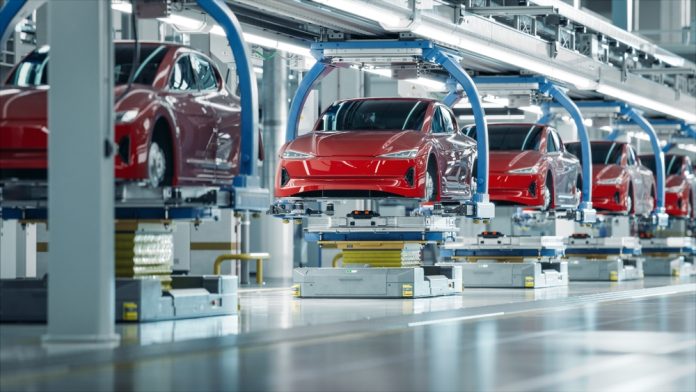In a significant move to support British car manufacturers and drive the shift towards cleaner transport, the UK Government has announced changes to the Zero Emission Vehicle (ZEV) Mandate.
These ZEV Mandate updates aim to provide greater flexibility for automakers while keeping the country on track to end the sale of new petrol and diesel cars by 2030.
The revised ZEV Mandate, unveiled as part of a broader strategy to reinforce industrial growth amidst global economic uncertainty, will make it easier for manufacturers to adapt production lines and meet evolving consumer demands.
Prime Minister Keir Starmer emphasised that British brands such as Rolls-Royce, Vauxhall, and Land Rover will benefit from enhanced stability and long-term support as they transition to electric vehicle (EV) production.
Starmer added: “I am determined to back British brilliance. Now more than ever, UK businesses and working people need a government that steps up, not stands aside.
“That means action, not words. So today, I am announcing bold changes to the way we support our car industry.
“This will help ensure home-grown firms can export British cars built by British workers around the world, and the industry can look forward with confidence, as well as back with pride.”
Flexibility and realism for a smoother transition
Recognising the complexity of transitioning to EV manufacturing, the UK Government has adjusted the ZEV Mandate to give carmakers more leeway.
While the core 2030 target remains – phasing out the sale of new petrol and diesel cars – manufacturers will now have increased flexibility on how and when they meet emissions targets leading up to the deadline.
Among the key revisions are the extended allowances for hybrid vehicle sales, with models like the Toyota Prius and Nissan e-Power permitted until 2035.
Additionally, rules allowing manufacturers to borrow ZEV credits will continue through to 2030, helping them manage production and innovation timelines more effectively.
This flexibility includes the ability to transfer credits between vans and cars, with defined ratios to preserve credibility in carbon reduction.
EV demand surges as government doubles down on infrastructure
The UK’s commitment to electrification is underscored by rising EV sales, which jumped over 40% in March compared to last year.
With over 382,000 electric vehicles sold in the UK in 2024, the nation now leads the European market and ranks third globally.
To support this growth, more than 75,000 public EV chargepoints are already in operation, with new ones being installed every 29 minutes.
A further £2.3bn in public funding is boosting British EV manufacturing and expanding the country’s charging network. This is complemented by generous tax incentives aimed at making EV ownership more accessible.
With operational savings of around £1,100 annually for EV drivers charging at home overnight and a growing selection of affordable models – including nearly 30 new electric cars under £30,000 – the shift to electric is becoming increasingly attractive to UK motorists.
Safeguarding British icons while embracing change
In a nod to the UK’s rich automotive heritage, small and micro-volume manufacturers – including luxury marques like McLaren and Aston Martin – will be exempt from ZEV Mandate targets.
This approach allows Britain’s high-performance vehicle segment to continue thriving without compromising the broader push for electrification.

The updated mandate also grants van manufacturers additional time, with internal combustion engine (ICE) vans permitted until 2035.
This phased transition will provide essential breathing space for both large-scale producers and supply chains to scale up zero-emission options.
A modern industrial strategy to power the future
Scheduled for full release this spring, a new Industrial Strategy will provide the roadmap for capitalising on emerging sectors like EVs.
The strategy is expected to focus on securing investment, supporting innovation, and driving sustainable economic growth across the UK.
In tandem with these plans, the government is working closely with the automotive sector to adapt to changing global trade dynamics.
As new international tariffs come into play, particularly from the United States, UK ministers have pledged to keep industry support under review and ensure competitiveness is protected.
Transport Secretary Heidi Alexander added: “We will always back British business. In the face of global economic challenges and stifled by a lack of certainty and direction for too long, our automotive industry deserves clarity, ambition and leadership. That is exactly what we are delivering today.
“Our ambitious package of strengthening reforms will protect and create jobs – making the UK a global automotive leader in the switch to EVs – all the while meeting our core manifesto commitment to phase out petrol and diesel vehicles by 2030.”
ZEV mandate marks a turning point for the UK automotive industry
With the ZEV Mandate updates, the UK Government is balancing ambition with practicality – ensuring that its climate targets remain intact while providing crucial breathing room for automakers.
As the country accelerates towards a zero-emission future, the combination of policy flexibility, infrastructure investment, and market incentives is positioning the UK as a global leader in electric mobility.
The changes announced today highlight a unified effort to future-proof the British car industry, spark innovation, and deliver sustainable growth for future generations.









